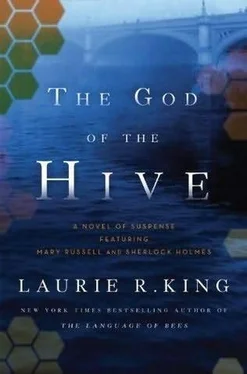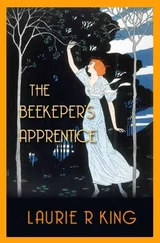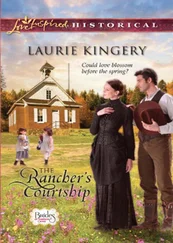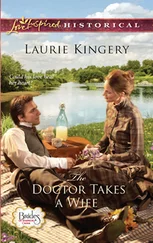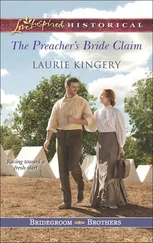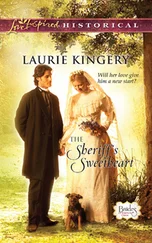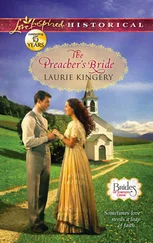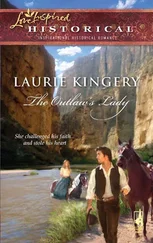“Stop here for a moment,” West said. He opened the door and stepped onto the roadway to study the bridge.
At this hour of the night, little stirred on London’s pavements. Mist hung over the Thames, and the smell of decay neared its turn. The Houses of Parliament stood beside him, toes in the water; at his back lay all the machinery of empire. Somewhere, a horse-cart clopped, sounding tired.
The roadway was deserted, the pools of light along its noble length pushing back the darkness. West started to get back into the motor, then stopped. What was that at the far end, half-hidden by the almost imperceptible curve in the roadway? Rubbish? Or-a child, at this time of night? No, it had to be a man, but even from a distance he could see the figure was too small to be the Holmes brother, or even the American wife.
“Is that someone sitting on the footway?” Buckner asked.
“It is.”
“What’s he doing?”
The figure was hunched over, looking at something on the ground. No, not just looking: He was doing something, his hunched shoulders moving. He was in his shirt-sleeves and wore a summer hat that should have been retired a week ago.
“Should I turn around?” Buckner asked.
West stepped up onto the running-board. With the added height, he could see that the figure’s back was turned.
“Hey,” Buckner said, “maybe he’s doing a drawing? There was this kid down the Embankment a couple months past, did a chalk drawing of the Mona Lisa before the police moved him away. The wife and I watched him for a while-he was pretty good.”
Buckner was married? West studied the figure, and gave another close survey of the surrounding buildings. No motion at all.
The minute hand three hundred feet overhead moved to the half hour; so quiet was the night, West heard the shift of machinery before the strike of bells.
Eight notes rang over the bridge, and faded.
West folded back inside the motor. “Go halfway out and stop in the centre of the bridge. Leave the motor running. Be prepared to leave rapidly.”
“Gotcher.”
Repressing a strong impulse to slap his driver on the skull with his gun, West closed the door. The motor purred forward and stopped, precisely in the centre of the bridge.
West pulled out the knife that he had taken from Thomas Brothers. With it in his hand and the gun in his overcoat pocket, he slid across the leather seat and opened the passenger-side door. He stepped out, letting the door swing back but not latch, then pulled open the front door and used the knife to slice through the rope holding his prisoner in place. The knife that had killed the prisoner’s wife, three and a half weeks before.
“Get out,” he said.
The blind and handcuffed artist blundered his way around and upright. West pulled him away from the motor, then moved up behind him and pressed the knife against the loose portion of the flour sack. Adler went still.
* * *
“Too close,” Lestrade said. Three hundred fifty yards away, the marksman was glued to his sights, his finger ready. He did not move, but Lestrade could feel disapproval radiating off the man’s shoulders at the interruption. “Sorry,” he said, and took a step away from the open window.
The man kneeling in the window had his sights not on the standing figures, but on the roof of the motor, on a line drawn with the driver. Holmes had been adamant: The man in charge must be taken alive. It was a matter of the empire’s security, that this villain give up his secrets.
And as if Holmes had heard Lestrade voice his doubts, had known that Lestrade intended to tell the marksman to fire wherever needed, a quarter of an hour later the telephone had rung again. This time, it was the Palace.
The standing figure was free to murder everyone in sight, and unless Lestrade’s shooter could absolutely, positively guarantee a shot that merely wounded the man, the villain would be free to run.
All Lestrade could do was curse and pray, with equal vehemence. But in silence.
I could not see either Holmes, standing near Boadicea, or Mycroft, inside the Parliamentary garden across the roadway from him. Nor could I see Billy, tucked into the street behind me, ready to pounce. But I saw the motorcar, creeping slowly onto the bridge. And a minute later I saw the two figures, pressed in close embrace on the passenger side.
And I could see Robert Goodman all too well, thirty yards away and playing, of all things, jackstones beneath one of the lamp standards on Westminster Bridge. What the hell was he up to?
Holmes tore his eyes away from the tableau in the centre of the span-Damian, it had to be-and looked across Bridge Street to where Mycroft stood, hidden by shadows. There was no signal-no need for one, in truth-but when the clock hand touched the next minute mark, the darkness shifted like the workings of the mighty clock, and Mycroft walked out into the light.
He stood facing the motorcar.
The two figures moved-for an instant Holmes could not breathe, thinking they were struggling-but they were merely moving, away from the pools of light and into the dimmest reaches between them. When they were but a doubled outline, a voice came down the roadway. “Mr Holmes?”
“One of them,” Mycroft answered, and removed his hat.
That would do for a signal, Holmes decided, and walked out from his own darkness, to stand, also hatless, in the pool of light opposite Mycroft.
The shocked silence was broken by Mycroft’s voice.
“I’m afraid your Mr Gunderson won’t be returning to your service. He is lying in a mis-marked grave, not far from here.”
Longer silence, then: “It matters not. Our agreement stands.”
The two brothers exchanged a look from their opposite lamp-posts, and Holmes walked onto the bridge.
I had my field glasses trained on the other end of the bridge, shifting back and forth across the roadway. I could hear faint voices, but not what they were saying. However, I could see Holmes start forward. I reached into my pocket to finger the keys of the motorcycle, parked and waiting in the lee of the hospital.
Holmes had closed half the distance between him and the motorcar when he heard a voice from ahead, and saw motion where the doubled figures stood-saw, too, what had caused it.
The blond figure that had come onto the bridge a minute before the motorcar appeared was gathering something from the pavement and getting to its feet. Goodman-it had to be he-turned towards the centre and began to walk in his quick, easy stride. His hands were free and seemed to be empty, and at each step his right hand reached out to slap the handrail in a cheery gesture. He was singing in a low voice, an old and half-familiar tune, wrapped up in his own world, to all appearances utterly unaware that there were others on the bridge.
Holmes could only keep moving, and hope the man holding Damian had steady nerves.
“Stop, there,” the man called, aimed at the small oncoming figure, who kept singing, kept patting, kept walking.
Holmes was a stone’s throw from the two figures when the man ordered him, too, to stop. He did so, hands outstretched.
He was close enough now to see that both men were masked, Damian entirely, the other man with a head-covering cut away to reveal eyes and mouth. The mask glanced over his shoulder at the oncoming figure, still oblivious and still close to the railing, then came around again to demand of Holmes, “Is this something of yours?”
“Nothing of mine,” Holmes replied, which was the absolute truth.
“Watch him,” he called over his shoulder to the driver, then to Holmes, “If he makes a move for his pockets, I’ll cut your son’s throat.”
Holmes fought to keep his voice reasonable. “Look at the fellow-he’s either drunk or a lunatic, and apt to do anything,” he protested, then added more mildly, “You really ought to climb back in your motor and get away while you can. You’ve seen that my brother is alive and well. If you’re as clever as I think you are, you could be across the Channel before the police can lay their blocks.”
Читать дальше
